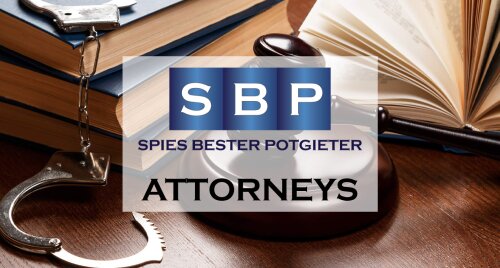Best Landlord & Tenant Lawyers in Pretoria
Share your needs with us, get contacted by law firms.
Free. Takes 2 min.
Free Guide to Hiring a Real Estate Lawyer
List of the best lawyers in Pretoria, South Africa
South Africa Landlord & Tenant Legal Questions answered by Lawyers
Browse our 3 legal questions about Landlord & Tenant in South Africa and read the lawyer answers, or ask your own questions for free.
- Can we evict tenants of our property if it is sold?
- May we evict the tenants of our property if it is sold. We have given them notice re this. They have not been paying rent nor deposit. We were very close of losing the house with the bank due to the tenants non payment
-
Lawyer answer by Recososa Law Firm
Hello:Under Philippine law, the rights of both the property owner and the tenants are governed mainly by the Civil Code and the Rent Control Act (if applicable depending on the rental amount). Since you mentioned that the tenants are not...
Read full answer - Eviction appeal
- Good day I had a tenant legally evicted and tool immediate occupation of my property she then went in later that day to her lawyers and got a re reentry court order, failing to disclose that I was already in the property. She and her boyfriend have broken in to... Read more →
-
Lawyer answer by SJ Law Experts
SJ Law Experts, IslamabadThank youSJ Law Experts, Islamabad [Advocates, Legal Advisors & Immigration Lawyers]
Read full answer - Is there a reason that my landlord is refusing to provide proof of putting my security deposit into an interest bearing account?
- The landlord at my former place of residence agreed to pay R8000 of my R11000 deposit after cleaning was done to the property. She provided a R2000 quotation fee but hasn't given me any other receipts to prove how the money was used. Despite that, I believe that cleaning was... Read more →
-
Lawyer answer by NARAG LAW OFFICE
That is not required by law. It is not even in the contract.
Read full answer
About Landlord & Tenant Law in Pretoria, South Africa
Landlord and tenant law in Pretoria, South Africa, forms a crucial part of the country's property law framework. This area addresses the rights and responsibilities of landlords and tenants involved in rental agreements, ensuring a balanced relationship. Whether you're renting residential or commercial property, understanding the legal obligations can help prevent disputes. The legal landscape is governed by both national legislation, such as the Rental Housing Act and the Consumer Protection Act, as well as local regulations. These laws set the parameters for lease agreements, rent escalation, deposit requirements, and tenant eviction procedures, among other aspects of tenancy relationships.
Why You May Need a Lawyer
Tenancy relationships can become complex, and there are several scenarios where legal assistance might be essential:
- Disputes over lease agreements, where terms are unclear or contested.
- Evictions, where landlords must ensure they follow proper legal procedures.
- Rental defaults or non-payment issues that require formal action.
- Cases involving unfair landlord practices, such as illegal rent increases or withholding of deposits.
- Addressing property damage claims and understanding rights concerning maintenance and repairs.
- Advice on breaking a lease early or understanding lease termination conditions.
Local Laws Overview
Pretoria operates under a framework influenced by both national and local laws which tenants and landlords should be well-versed in:
- Rental Housing Act: Governs lease agreements, including the requirement for written documentation and stipulations regarding rent deposits and interest.
- Consumer Protection Act: Applies to lease agreements concluded as part of a regular business, outlining tenants' rights to fair terms and equal consumer protection.
- Prevention of Illegal Eviction from and Unlawful Occupation of Land Act (PIE): Provides guidelines for the eviction process, ensuring protections for unlawful occupants against illegal evictions.
- Municipal Bylaws: Local regulations that may influence tenancy agreements, usually concerning zoning and property usage rules.
Frequently Asked Questions
What should be included in a lease agreement?
A valid lease agreement must typically include the names of the parties, description of the property, rental amount, deposit terms, duration of the lease, obligations of both parties, and procedures for renewal or termination.
Can a landlord evict a tenant immediately if they stop paying rent?
No, eviction is a legal process in South Africa. The landlord must follow formal procedures outlined by the PIE Act, which typically involves obtaining a court order for eviction.
Are there limits on how much a landlord can increase rent?
While there is no set maximum for rent increases, any hike must be considered reasonable and should usually be stipulated in the lease agreement or through mutual agreement.
Is a verbal lease agreement valid in Pretoria?
Although verbal agreements are technically valid, they can lead to disputes. It is highly recommended that lease agreements be in writing for clarity and to serve as legal documentation.
What is the legal requirement for returning a tenant's deposit?
The Rental Housing Act mandates that a landlord must return the deposit, with interest, within 7 days after the lease ends, provided there are no damages or arrears.
Who is responsible for repairs and maintenance?
Landlords are typically responsible for maintaining the property in a habitable condition, while tenants are usually responsible for daily upkeep and any damage they cause beyond normal wear and tear.
Can a tenant break a lease early?
Yes, tenants may terminate their lease early, but only by providing 20 business days' notice, usually incurring penalties unless tenant's circumstances justify such actions under the CPA.
What happens if the property is sold while I am leasing it?
The new owner must honor any existing lease agreement and the tenant retains a right to occupy the property for the lease term, unless an agreement is reached otherwise.
Are there specific laws about subletting a property?
Subletting depends on the stipulations within the initial lease. Tenants generally need express written permission from the landlord to sublet legally.
How can disputes between landlords and tenants be resolved?
Disputes can be taken to the Rental Housing Tribunal, a body specifically empowered to resolve conflicts through mediation and arbitration, avoiding costly court battles.
Additional Resources
Several resources and organizations can assist parties seeking advice or resolution in landlord and tenant matters:
- Rental Housing Tribunal: A valuable resource for dispute resolution and advice.
- Legal Aid South Africa: Provides free or affordable legal assistance to those who qualify.
- Department of Human Settlements: Offers guidelines and help with understanding housing regulations.
- South African Property Owners Association: Offers insights and advice, especially for landlords and property owners.
Next Steps
If you need legal assistance concerning landlord and tenant disputes in Pretoria, consider the following steps:
- Consultation: Schedule a meeting with a local attorney specializing in property law to understand your legal position and options.
- Documentation: Compile all relevant documents and correspondence related to your matter, including lease agreements and communication records.
- Determine Objective: Decide on a desired outcome, whether it's negotiation, mediation, or legal action.
- Utilize Resources: Reach out to the Rental Housing Tribunal or legal aid services for guidance and support.
Understanding your rights and obligations in Pretoria's landlord and tenant laws enables you to navigate issues effectively, and consulting with the right legal professionals ensures you have the support needed to resolve disputes amicably and lawfully.
Lawzana helps you find the best lawyers and law firms in Pretoria through a curated and pre-screened list of qualified legal professionals. Our platform offers rankings and detailed profiles of attorneys and law firms, allowing you to compare based on practice areas, including Landlord & Tenant, experience, and client feedback.
Each profile includes a description of the firm's areas of practice, client reviews, team members and partners, year of establishment, spoken languages, office locations, contact information, social media presence, and any published articles or resources. Most firms on our platform speak English and are experienced in both local and international legal matters.
Get a quote from top-rated law firms in Pretoria, South Africa — quickly, securely, and without unnecessary hassle.
Disclaimer:
The information provided on this page is for general informational purposes only and does not constitute legal advice. While we strive to ensure the accuracy and relevance of the content, legal information may change over time, and interpretations of the law can vary. You should always consult with a qualified legal professional for advice specific to your situation.
We disclaim all liability for actions taken or not taken based on the content of this page. If you believe any information is incorrect or outdated, please contact us, and we will review and update it where appropriate.
















